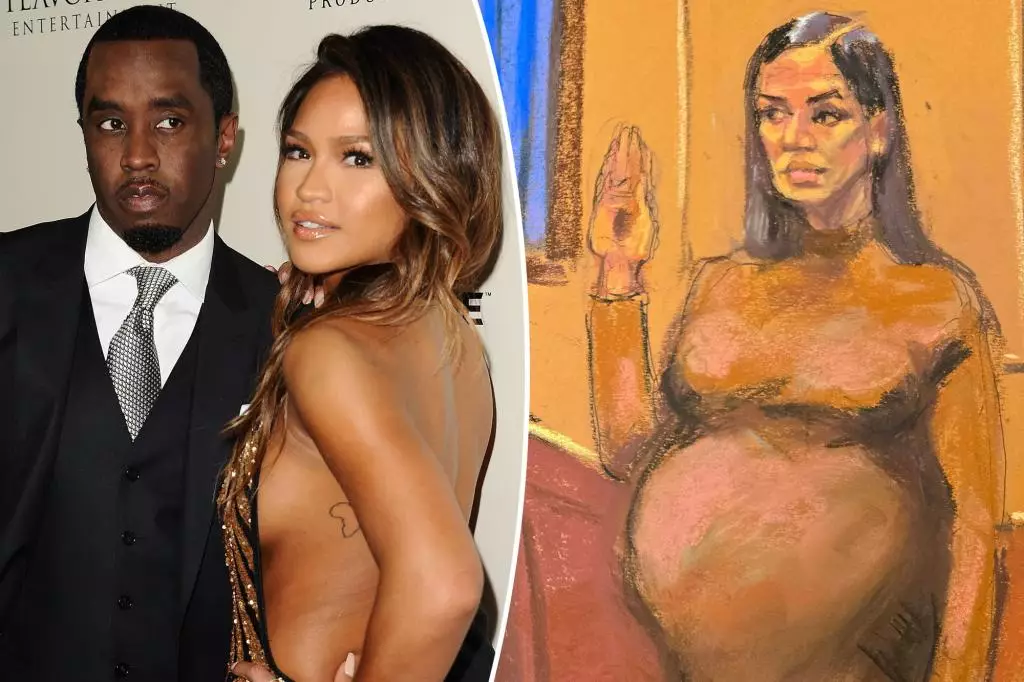In a groundbreaking testimony that has captured the public’s attention, Cassie Ventura, a well-known singer and model, has bravely unfolded her harrowing experiences during her tumultuous relationship with Sean “Diddy” Combs. Ventura’s recounting of the so-called “Freak-Offs”—wild parties filled with drugs and sexual exploitation—offers a window into a sordid world where the line between love and manipulation blurs dangerously. It raises critical questions about the nature of consent and the impacts of fame and power in relationships.
Ventura, who is currently expecting her third child, took the witness stand during Combs’ ongoing sex trafficking trial, shedding light on an array of disturbing allegations. “The ‘Freak-Offs’ became a job,” she described, indicating the extent of dehumanization and exploitation she faced. Far from being mere leisure activities, these gatherings, as she explained, consumed her life—leaving little room for personal recovery or well-being. The manipulation underlying these events is chilling, reflecting a broader pattern of control from powerful figures over their partners.
Testimony of Torture and Control
Perhaps even more disturbing than the raucous parties is the underlying brutality that Ventura described in her relationship. Seemingly trivial disagreements escalated into physical violence, with Ventura detailing her ex’s propensity for intimidation and abuse. “He would bash me on my head, knock me over, drag me, kick me,” she testified, unveiling a legacy of fear that overshadowed any semblance of love. This account exposes the psychological toll of such trauma; the mere act of making “the wrong face” led to repercussions that seared deep into her psyche.
This duality—of being in love yet continually subjected to violence—highlights the complex interplay between affection and fear in abusive relationships. It’s crucial to analyze how such situations are normalized within certain circles, especially in the celebrity world, where power dynamics often tilt towards disadvantageous positions for those with lesser influence.
Systemic Failures and the Role of Power
Ventura’s allegations align with a larger, systemic issue within industries dominated by celebrity culture, where power often becomes synonymous with abuse. Diddy, a figure at the pinnacle of hip-hop fame, epitomizes the conflation of celebrity status with misconduct. The rapid settlement of Ventura’s lawsuit against him following her allegations raises further eyebrows—was this a mechanism to silence a victim, or simply a business decision to preserve a tarnished reputation? The underlying dynamics of wealth, influence, and fear cannot be overlooked in the analysis of this case.
Adding to the grim narrative are reports of Diddy attempting to silence witnesses during investigations, including offering bribes to law enforcement officials, as mentioned by a LAPD officer present during one incident of violent confrontation with Ventura. Such actions underline the lengths to which individuals in power might go to evade accountability, raising critical discussions about trust in institutions meant to protect victims.
The Cultural Conversation Around Consent
As more details emerge from this ongoing trial, the cultural conversation surrounding consent, agency, and sexual exploitation becomes increasingly urgent. Ventura’s testimony serves as an unsettling reminder that the quest for personal happiness can easily fall prey to the darker inclinations of those wielding power. It urges society to examine how superficial allure can mask deeper, more sinister issues, particularly in high-stakes environments like the entertainment industry.
The notion of what it means to seek approval and love in abusive contexts is a heartbreaking yet persistent theme. Ventura’s courage in revealing her story has not just exposed a personal tragedy but has also resonated with many who endure similar experiences, thereby encouraging an open dialogue about the necessity for change in how these situations are viewed culturally and legally.
In a world where celebrity often eclipses human dignity, Cassie Ventura’s brave stand brings a flicker of hope that the truth can lead to transformative conversations around abuse, power, and healing. These revelations are not simply a glimpse into a personal narrative, but a clarion call for society to reassess its values surrounding consent and the treatment of individuals in vulnerable positions. As the trial unfolds, the implications for both Ventura and Combs reach far beyond the courtroom, touching on a collective societal responsibility to stand against abuse in all of its manifestations.

Leave a Reply